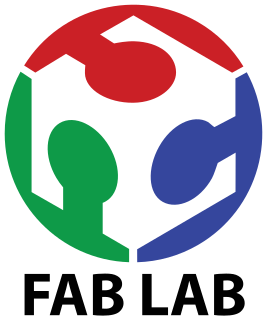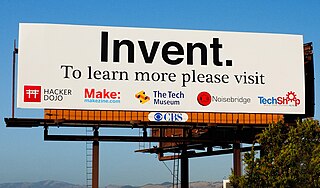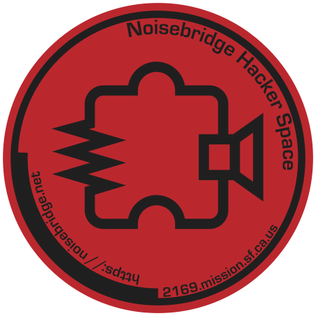
"Do it yourself" ("DIY") is the method of building, modifying, or repairing things by oneself without the direct aid of professionals or certified experts. Academic research has described DIY as behaviors where "individuals use raw and semi-raw materials and parts to produce, transform, or reconstruct material possessions, including those drawn from the natural environment ". DIY behavior can be triggered by various motivations previously categorized as marketplace motivations, and identity enhancement.

A fab lab is a small-scale workshop offering (personal) digital fabrication.

The International Genetically Engineered Machine (iGEM) competition is a worldwide synthetic biology competition that was initially aimed at undergraduate university students, but has since expanded to include divisions for high school students, entrepreneurs, and community laboratories, as well as 'overgraduates'.
Body hacking is the application of the hacker ethic in pursuit of enhancement or change to the body's functions through technological means, such as do-it-yourself cybernetic devices or by introducing biochemicals.

Mitch Altman is a San Francisco-based hacker and inventor, best known for inventing TV-B-Gone, as featured speaker at hacker conferences, as international expert on the hackerspace movement, and for teaching introductory electronics workshops. He is also Chief Scientist and CEO of Cornfield Electronics.

A hackerspace is a community-operated, often "not for profit", workspace where people with common interests, such as computers, machining, technology, science, digital art, or electronic art, can meet, socialize, and collaborate. Hackerspaces are comparable to other community-operated spaces with similar aims and mechanisms such as Fab Lab, men's sheds, and commercial "for-profit" companies.

DIYbio is an informal umbrella organization for individuals and local groups active in do-it-yourself biology, encompassing both a website and an email list. It serves as a network of individuals from around the globe that aims to help make biology a worthwhile pursuit for citizen scientists, biohackers, amateur biologists, and do-it-yourself biological engineers who value openness and safety. It was founded by Jason Bobe and Mackenzie Cowell in 2008.
Do-it-yourself biology is a growing biotechnological social movement in which individuals, communities, and small organizations study biology and life science using the same methods as traditional research institutions. DIY biology is primarily undertaken by individuals with limited research training from academia or corporations, who then mentor and oversee other DIY biologists with little or no formal training. This may be done as a hobby, as a not-for-profit endeavour for community learning and open-science innovation, or for profit, to start a business.

Pumping Station: One is a non-profit hackerspace/makerspace in Chicago, Illinois. The facilities consist of approximately 11,000 square feet (1,000 m2) of shop, workspace, and lounge areas.

The maker culture is a contemporary subculture representing a technology-based extension of DIY culture that intersects with hardware-oriented parts of hacker culture and revels in the creation of new devices as well as tinkering with existing ones. The maker culture in general supports open-source hardware. Typical interests enjoyed by the maker culture include engineering-oriented pursuits such as electronics, robotics, 3-D printing, and the use of computer numeric control tools, as well as more traditional activities such as metalworking, woodworking, and, mainly, its predecessor, traditional arts and crafts.

Noisebridge is an anarchistic hackerspace located in San Francisco, inspired by European hackerspaces Metalab and c-base in Berlin. It is a registered non-profit California corporation, with IRS 501(c)(3) charitable status. It describes itself as "a space for sharing, creation, collaboration, research, development, mentoring, and learning," and outside of its headquarters forms a wider community around the world. It was organized in 2007 and has had permanent facilities since 2008.

A tool library is an example of a Library of Things. Tool libraries allow patrons to check out or borrow tools, equipment and "how-to" instructional materials, functioning either as a rental shop, with a charge for borrowing the tools, or more commonly free of charge as a form of community sharing. A tool library performs the following main tasks:

Baltimore Hackerspace is a hackerspace, sometimes called a makerspace, located in Baltimore, Maryland. Its creation has been inspired and modeled after the many other Hackerspaces around the United States and Europe.
The Glowing Plant project was the first crowdfunding campaign for a synthetic biology application. The project was started by the Sunnyvale-based hackerspace Biocurious as part of the DIYbio philosophy. According to the project's goals, funds were used to create a glowing Arabidopsis thaliana plant using firefly luminescence genes. Long-term ambitions (never realized) included the development of glowing trees that can be used to replace street lights, reducing CO2 emissions by not requiring electricity.

Genspace is a non-profit organization and a community biology laboratory located in Brooklyn, New York. Stemming from the hacking, biohacking, and DIYbio movements, Genspace has focused on supporting citizen science and public access to biotechnology. Genspace opened a Biosafety Level One laboratory in December 2010. Since its opening, Genspace has supported projects, events, courses, art, and general community resources concerning biology, biotechnology, synthetic biology, genetic engineering, citizen science, open source software, open source hardware, and more.

A library makerspace, also named Hackerspace or Hacklab, is an area and/or service that offers library patrons an opportunity to create intellectual and physical materials using resources such as computers, 3-D printers, audio and video capture and editing tools, and traditional arts and crafts supplies. In the field of library science, makerspaces are classified as a type of library service offered by librarians to patrons.
The Baltimore Underground Science Space (BUGSS) is a non-profit synthetic biology and biotechnology makerspace laboratory for science enthusiasts, hobbyists, and professionals to practice, share and learn about the biological sciences. BUGSS is closely aligned with do-it-yourself biology and the Maryland science community generally, and offers courses and lectures in addition to community lab space. It was founded by Dr. Tom Burkett in 2012. It is located in the Highlandtown neighborhood of Baltimore, Maryland.
BioCurious is a community biology laboratory and nonprofit organization located in Sunnyvale, California, co-founded by Eri Gentry, Kristina Hathaway, Josh Perfetto, Raymond McCauley, Joseph Jackson, and Tito Jankowski. With the help of Kickstarter and 239 backers they raised $35,319. BioCurious is a complete working laboratory and technical library for entrepreneurs to access equipment, materials, and co-working space, and a meeting place for citizen scientists, hobbyists, activists, and students. Scientific American magazine has described BioCurious as "one of country’s premier community biotechnology labs [...]".

Artisan's Asylum is a non-profit community workshop in Somerville, Massachusetts. Artisan's Asylum was founded in 2010 by an engineer, an artist, and friends who needed an affordable place to build and make things. The Asylum was the first makerspace to incorporate in the U.S. in 2012 and today is a 40,000 square feet fabrication wonderland. Once believed to be the largest makerspace in the world, the Asylum remains among the largest, home to more than 430 members, 160 studios, and 15 workshops. Shops include woodworking, welding, bicycle maintenance and repair, machining, electronics and robotics, jewelry, digital fabrication, a digital photo studio, fiber arts, casting, laser cutting, CNC machines, prop shop, and design lab. The Asylum hosts 30-40 public classes each month, providing hands-on tool training and skills building courses. As of 2013, the Asylum housed 40 or 50 small manufacturing companies, and raised the number of manufacturing firms in Somerville by 50%. The Asylum is credited with attracting the greentech incubator Greentown Labs to Somerville and contributing substantially to the value of the creative economy in Somerville.
Open Works is a 34,000 square feet "incubator for Baltimore's creative economy." It houses shared wood, metal, and digital fabrication, textiles, and electronics workspaces, as well as 150 private studios. They're also a Fab lab and have a mobile program. The $10m project's establishment was funded by Baltimore Arts Realty Corps. (BARCO), a non-profit dedicated to creating "safe, affordable, sustainable spaces for artists."














